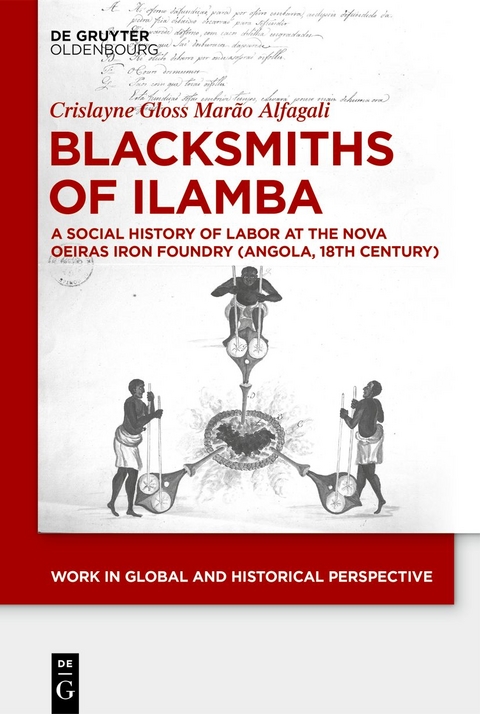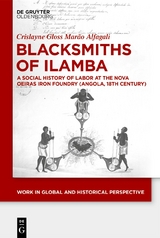Blacksmiths of Ilamba
A Social History of Labor at the Nova Oeiras Iron Foundry (Angola, 18th Century)
Seiten
2023
De Gruyter Oldenbourg (Verlag)
978-3-11-078651-4 (ISBN)
De Gruyter Oldenbourg (Verlag)
978-3-11-078651-4 (ISBN)
This series will trace at the example of work the historical connections between regions and critically engage with the idea of the North Atlantic World as normal and the rest as exceptional. The aim is to publish studies that change focus back and forth from the intimacy and complexity of relationships in specific places and their connections to distant places and long-term processes of change thereby looking beyond locality and region.
This study analyzes the establishment of an iron foundry in the interior 18th-century of Angola. It was a fruit of the Portuguese Enlightenment, which encouraged investment in manufacturing, particularly of iron, a metal indispensable for military and technological purposes. However, the plans faced the resistance of African blacksmiths and founders who refused to learn foreign techniques and work processes. By emphasizing Central African agency, the book highlights the successful strategies of historical actors who scholars have largely ignored. Based upon a wide variety of sources from Brazilian, Portuguese, and Angolan archives, the book reconstructs how Africans were taken to work at the foundry and the important role they played in developing the form of production employed there. By emphasizing continuities with African technology and the quality of the iron produced, it counters interpretations of the project as an example of the failure of the Portuguese Enlightenment. The analysis demonstrates the circulation of knowledge about iron production, thus revitalizing debates that have posited knowledge transmission as unidirectional. It also highlights the relationship between local political leaders and the colonial government, in addition to elucidating the processes by which workers were organized.
This study analyzes the establishment of an iron foundry in the interior 18th-century of Angola. It was a fruit of the Portuguese Enlightenment, which encouraged investment in manufacturing, particularly of iron, a metal indispensable for military and technological purposes. However, the plans faced the resistance of African blacksmiths and founders who refused to learn foreign techniques and work processes. By emphasizing Central African agency, the book highlights the successful strategies of historical actors who scholars have largely ignored. Based upon a wide variety of sources from Brazilian, Portuguese, and Angolan archives, the book reconstructs how Africans were taken to work at the foundry and the important role they played in developing the form of production employed there. By emphasizing continuities with African technology and the quality of the iron produced, it counters interpretations of the project as an example of the failure of the Portuguese Enlightenment. The analysis demonstrates the circulation of knowledge about iron production, thus revitalizing debates that have posited knowledge transmission as unidirectional. It also highlights the relationship between local political leaders and the colonial government, in addition to elucidating the processes by which workers were organized.
Crislayne Gloss Marão Alfagali, Pontifical Catholic University of Rio de Janeiro, Brazil.
| Erscheinungsdatum | 10.05.2022 |
|---|---|
| Reihe/Serie | Work in Global and Historical Perspective ; 15 |
| Zusatzinfo | 43 col. ill., 8 b/w tbl. |
| Verlagsort | Basel/Berlin/Boston |
| Sprache | englisch |
| Original-Titel | Alfagali, Crislayne Gloss Marão Ferreiros e fundidores da Ilamba. Uma história social da fabricação de ferro e da Real Fábrica de Nova Oeiras (Angola, segunda metade do século XVIIII) / Crislayne Gloss Marão Alfagali. – 1 ed. – Luanda: Fundação Dr. Antón |
| Maße | 155 x 230 mm |
| Gewicht | 705 g |
| Themenwelt | Geisteswissenschaften ► Geschichte ► Regional- / Ländergeschichte |
| Geschichte ► Teilgebiete der Geschichte ► Kulturgeschichte | |
| Schlagworte | Angola • Colonialism • Eisenverarbeitung • Geschichte der Arbeit • iron processing • Knowledge • Kolonialismus • labour history • Wissen |
| ISBN-10 | 3-11-078651-6 / 3110786516 |
| ISBN-13 | 978-3-11-078651-4 / 9783110786514 |
| Zustand | Neuware |
| Informationen gemäß Produktsicherheitsverordnung (GPSR) | |
| Haben Sie eine Frage zum Produkt? |
Mehr entdecken
aus dem Bereich
aus dem Bereich
der stille Abschied vom bäuerlichen Leben in Deutschland
Buch | Hardcover (2023)
C.H.Beck (Verlag)
23,00 €
Die Revolution des Gemeinen Mannes
Buch | Softcover (2024)
C.H.Beck (Verlag)
12,00 €




